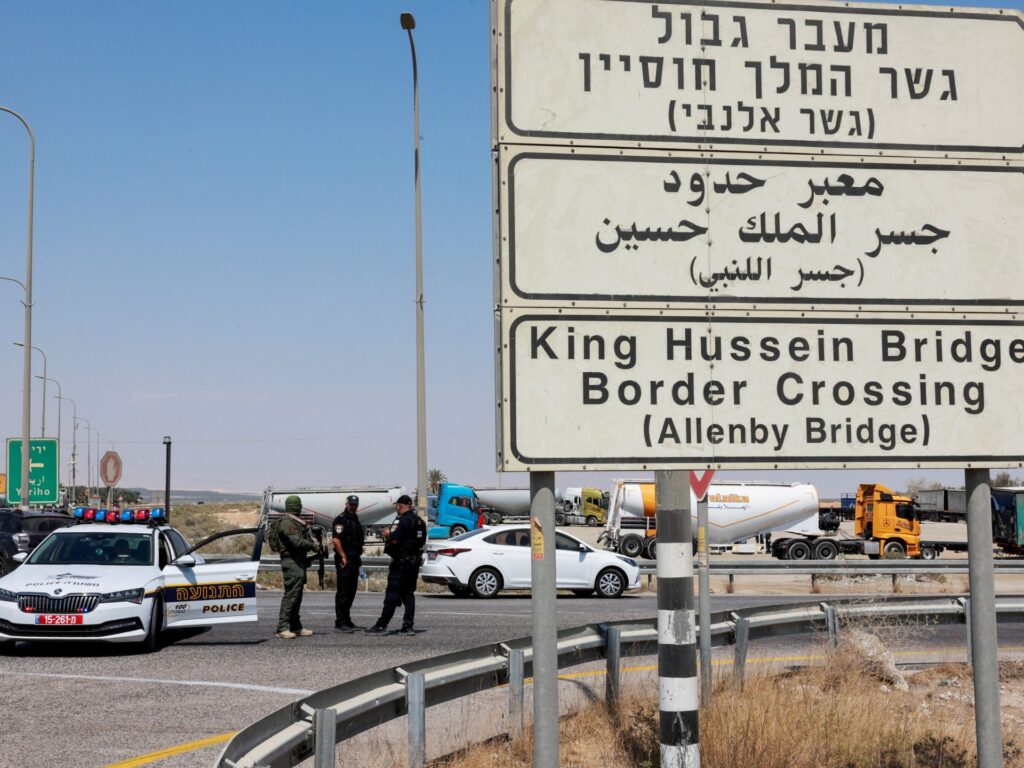The closure of the King Hussein (Allenby) Bridge is the latest in a long line of collective punishments imposed by Israeli forces.
Israel has ordered the indefinite closure of the King Hussein Bridge, also known as the Allenby Bridge, stopping the passage of goods and people through the only gateway between the occupied West Bank and Jordan, Palestinian authorities say.
Israel will close the bridge crossing starting on Wednesday until further notice, the Palestinian General Authority for Borders and Crossings said on Tuesday. The Jordanian Public Security Directorate also announced the closure, saying the crossing was being shut “to passenger and cargo traffic by the other side until further notice”.
Recommended Stories
list of 3 itemsend of list
The crossing, which is practically the only exit and entry point for Palestinians wishing to travel outside the West Bank, was opened on Sunday after it was temporarily closed following a deadly attack.
A Jordanian national travelling in a humanitarian aid truck killed two Israeli soldiers at the Israeli-controlled crossing last week. Hamas’s armed wing, the Qassam Brigades, claimed responsibility for the shooting.
‘Countermeasure to recognition of Palestinian statehood’
Al Jazeera’s Hamdah Sahut, reporting from Jordan’s capital, Amman, said: “There are a lot of questions up in the air as to why [Israeli Prime Minister Benjamin] Netanyahu has decided to close the border entirely.”
“Some within Israeli media are reading it as one of the first countermeasures Israel is taking as a result of many countries in the international community recognising a Palestinian state,” said Sahut, who is reporting from Amman because Israel’s government has banned Al Jazeera from reporting inside Israel and the West Bank.
The crossing in the Jordan Valley, known as Karama on the Palestinian side, is the only international gateway for Palestinians from the West Bank that does not require entering Israel, which has occupied the territory since 1967.
Last week’s attack left Palestinians on edge as Israeli forces began a campaign of collective punishment, ordering the suspects’ homes in the West Bank demolished and their neighbours’ work permits revoked.
A week before the attack at the bridge, Israeli forces detained more than 100 Palestinians in raids in the West Bank city of Tulkarem and imposed a curfew.
Palestinians have to navigate hundreds of checkpoints and are often frisked by Israeli soldiers while travelling inside the West Bank, making their daily movements a harrowing and humiliating experience, campaigners said.
As the world’s focus has been on Israel’s genocidal war on Gaza in the past two years, Israel has launched a crackdown on the West Bank, killing more than 1,000 Palestinians there, arresting thousands, and demolishing hundreds of homes and civic infrastructure. Even before the October 7, 2023, attack inside Israel by Hamas-led Palestinian groups, Israeli military and settler violence was at its highest level in years.
Netanyahu and members of his cabinet have pledged to annex the West Bank despite international calls for the establishment of a Palestinian state as part of a two-state solution.
But Netanyahu last week said there “will be no Palestinian state” as he announced a new settlement expansion on Palestinian land. Settlements, which are illegal under international law, are a big hurdle to the realisation of a sovereign Palestinian state.
On Monday, France joined four other countries to recognise Palestinian statehood. Australia, Canada, Portugal and the United Kingdom formally made the move to recognise Palestine a day earlier.
With more than 80 percent of the international community now recognising the state of Palestine, diplomatic pressure has ramped up on Israel as it continues the war on Gaza, where more than 65,300 Palestinians have been killed and the enclave has been turned into rubble.

